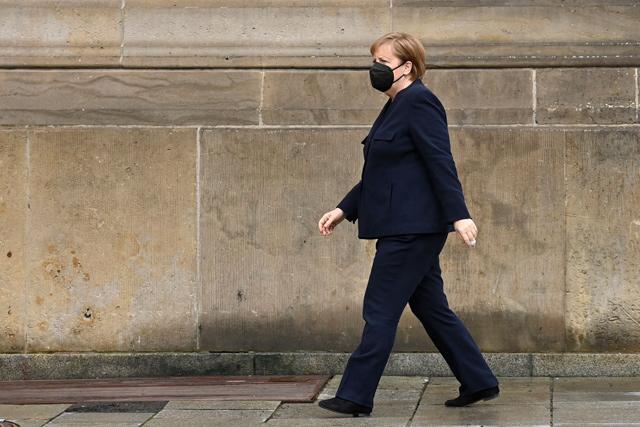You are here
Merkel party wins big in last German state poll before general election
By AFP - Jun 07,2021 - Last updated at Jun 07,2021

Alexander Gauland (centre), parliamentary group co-leader of Germany's far-right Alternative for Germany party, reacts at the party's venue following the release of the first results in the regional elections in the German state of Saxony-Anhalt, in Magdeburg, eastern Germany, on Sunday (AFP photo)
MAGDEBURG, Germany — Angela Merkel's conservatives scored a convincing win in state elections in Saxony-Anhalt on Sunday, seeing off a threat from the far-right AfD in the final regional poll before the first election in 16 years not to feature the veteran chancellor.
The CDU under new party chief Armin Laschet won between 35 and 36 per cent of the vote, exit polls showed, with the anti-immigration party on between 22.5 and 23.5 per cent.
Pollsters had foreseen a neck-and-neck race between the CDU and the AfD, with one survey for the Bild daily even predicting the far-right party would win a state poll for the first time.
Saxony-Anhalt is one of Germany’s smallest states with a population of just 2.2 million, but Sunday’s clear victory gives the conservatives and their new leader Armin Laschet a big boost in the run-up to Germany’s national election on September 26.
“This is essentially a sensationally good result,” CDU General Secretary Paul Ziemiak said.
“CDU has won this eleciton clearly. Today is a good day.”
Merkel’s party has been a dominant force in the eastern region for decades, topping all but one edition of state elections there since reunification in 1990.
‘Clear profile’
But the AfD established a strong foothold there in 2016, having capitalised on anger over Merkel’s decision to allow in a wave of migrants from conflict-torn countries such as Syria in 2015.
In that election, the CDU scooped 30 per cent, forming a coalition with the Social Democrats and Greens. The AfD won 24 per cent.
Although support for the AfD at the national level has stagnated at around 10 to 12 per cent in recent months, the party continues to hold its own in the former East German states.
Nevertheless, the party has failed to increase its share of the vote in Saxony-Anhalt, despite recent moves to attract voters by styling itself as the party bashing Merkel’s tough shutdown measures during the pandemic.
The result is also a huge boost for Armin Laschet, who was nominated as the conservative chancellor candidate in April but had faced a series of setbacks as Merkel prepares to bow out.
Support for the CDU had plummeted earlier in the year amid anger over the government’s pandemic management and a corruption scandal involving shady coronavirus mask contracts.
At Germany’s last regional elections in March — in the states of Rhineland Palatinate and Baden-Wuerttemberg — the CDU suffered its worst ever results in both states.
But the mood has picked up in Germany in recent weeks with the country’s vaccination campaign gathering pace and large parts of the country reopening after months of shutdowns.
Laschet has promised to maintain the CDU as the “force of the political middle ground”.
Ziemiak credited Laschet for the strong showing Sunday, underlining his participation in the campaign there along with Saxony-Anhalt’s state premier Reiner Haseloff.
The result was “the largest increase [in vote share] in a state election since the victory of the CDU in North Rhine-Westphalia in 2017” — a win that Laschet had scooped for the CDU at that time.
Laschet, who is state premier of North Rhine-Westphalia, had succeeded in attracting voters by standing for “unity and a clear profile” on major structural changes in the region, said Ziemiak.
Related Articles
BERLIN — The two conservative leaders locked in an increasingly vicious battle for Angela Merkel’s crown struggled to reach a deal by their
BERLIN — German Chancellor Angela Merkel’s centre-right party on Monday celebrated a thumping win over the far-right in the last regional vo
BERLIN — German Chancellor Angela Merkel’s CDU Party said on Monday it would push back a congress planned for early December to elect a new














